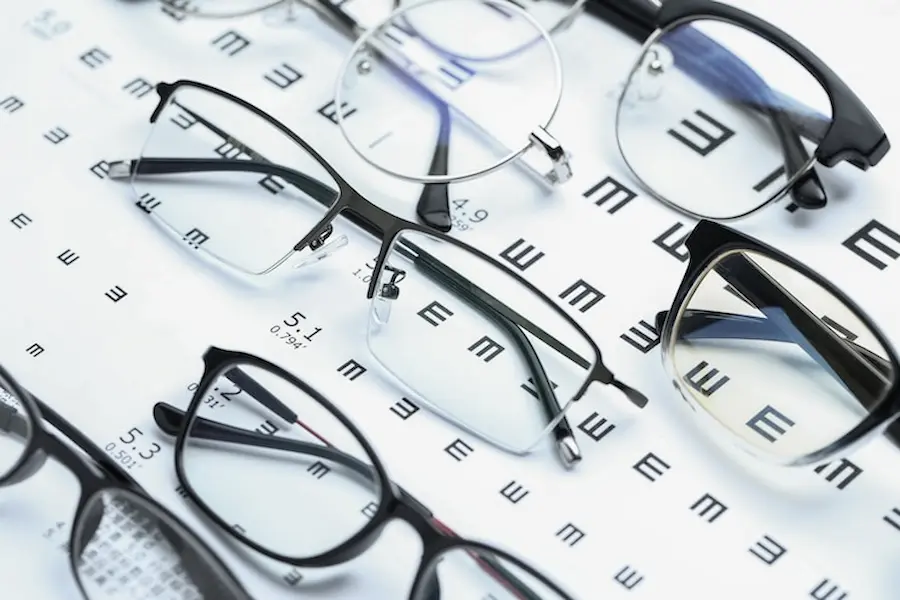In our increasingly online world, it’s pretty much impossible to get by without using devices with screens of some kind. We need our smart phones to talk and text with each other, we need our laptops to get our work done, and we need our TV screens to enjoy entertainment. In the space of a single day, the average person tends to spend seven-to-eight hours or more looking at screens. That’s about half of our typical waking hours! With so much time spent looking at screens, our eyes can suffer from various negative side effects. This is due to the blue light electromagnetic waves that screens produce. While the lenses and corneas of the eyes provide us protection from the damaging UV rays of the sun, they don’t block out blue light. While blue light in small doses isn’t inherently bad for our eyes, it’s the constant amount of exposure we get at a close range that can be a cause of concern for our eye health.
One of the best ways to help protect your eyes from blue light overexposure is by wearing blue light glasses. Blue light glasses contain lenses made with technology specifically designed to filter out a percentage of blue light rays, so your eyes are less exposed. If you’re wondering if you need blue light glasses, read on to find out how they can help protect your eyes from the negative effects of too much blue light screen time.
Table of Contents
What Is Blue Light?
Blue light is one of the few forms of light that’s visible to humans on earth. Like all visible light sources, blue light is created by electromagnetic waves. Electromagnetic waves can vary in length depending upon the light source; blue light waves are short, and high energy. The most prevalent source of blue light is the sun; however, we are also exposed to blue light at a closer range by digital screens backlit by LED lights. Blue light can be damaging to our retinas, the part of our eyes that take in light and convert it into neural signals that the brain uses to create and recognize images. If exposed to too much blue light, you could put yourself at risk for damaging your retinas as well as other forms of eye strain.
What Do Blue Light Glasses Do?
Blue light glasses help to reduce the negative side effects that prolonged exposure to blue light screens can cause. They’re a great option for those who spend most of their work and school days looking at screens. Blue light glasses contain lenses that specifically filter out a portion of the blue light rays that LED screen devices emit, so you can look at them without exposing your eyes to as much potential damage.
Help Prevent Migraines
Migraines are a form of extreme headache that can easily be triggered by light. For those who suffer from chronic migraines, looking at screens for too long can lead to frequent, painful migraine attacks. As such, wearing blue light glasses can help to reduce the prevalence of migraines and other headaches caused by looking at screens.
Maintain Your Circadian Rhythm
Blue light plays a big part in your circadian rhythm, which affects your sleep and waking cycle. When you expose yourself to blue light during the morning, it signals to your body that it’s time to wake up. However, if you expose yourself to blue light at night, you’re more likely to throw off your circadian rhythm, as the blue light will reduce the amount of melatonin your body produces and keep you awake longer. Doctors often recommend limiting your screen time within the two hours before you go to bed. However, this can be difficult for those who enjoy watching television or scrolling on their phones to wind down at night. If you’ve got to look at screens before bed, wearing blue light glasses can help to reduce the likelihood of throwing off your circadian rhythm.
Reduce The Prevalence Of Dry Eyes
One of the most common symptoms people report as a result of staring at blue light screens for too long is dry eyes. When we look at blue light screens, we tend to blink less. As a result, our eyes become drier. By wearing blue light glasses, you reduce the amount of blue light your eyes intake, so your eyes will be able to blink more and create more moisture.
In Conclusion
Blue light glasses are a great form of eyewear to have on hand to protect your eyes from the adverse effects of prolonged blue light exposure. With our work and home lives becoming more and more tied to our digital devices, it’s hard to avoid screens entirely. Given this, blue light glasses can help to lessen our blue light exposure so we can use our screens without worrying about causing damage to our eyes.

